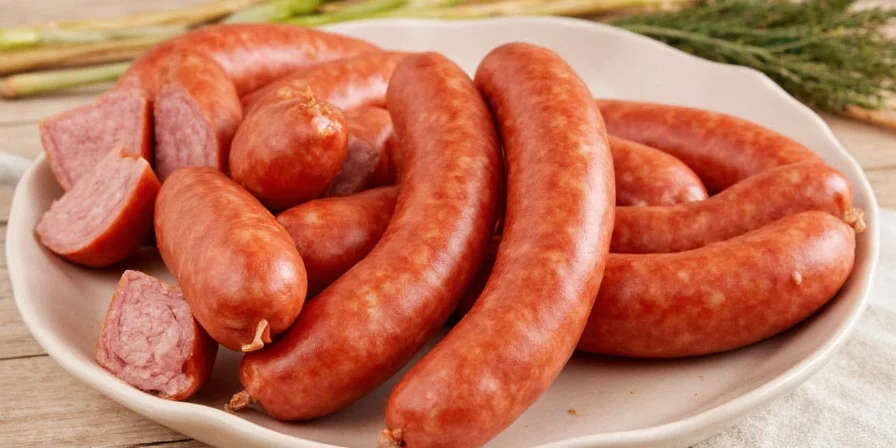What’s Inside Italian Sausage? A Spicy Deep Dive into Flavor & Ingredients
If you’ve ever bitten into a juicy Italian sausage and thought, 'What magic is this?', then you’re not alone. Whether it’s sizzling on the grill or simmering in your grandma’s secret pasta sauce, Italian sausage is the culinary equivalent of a warm hug — if hugs came with a kick of flavor.
In this article, we're peeling back the casing to uncover the real stars of the show: the spices and ingredients that make Italian sausage what it is — bold, aromatic, and absolutely crave-worthy. Let’s get spiced up!
Table of Contents
- Introduction
- The Meat Matters
- The Spice Lineup
- Sweet vs. Hot: What’s the Diff?
- Make Your Own: DIY Italian Sausage
- Frequently Asked Questions
- Conclusion
Welcome to the World of Italian Sausage
Italian sausage isn’t just a meaty tube of goodness — it’s a flavor-packed legend. But here’s the thing: the real magic lies in the spices. While pork provides the canvas, the spice mix is the paint that turns every bite into a masterpiece.
And whether you’re grilling for game night or prepping Sunday dinner, knowing what’s inside your sausage can elevate your cooking from “meh” to “Magnifico!”

The Meat Behind the Magic
The base of any Italian sausage is usually ground pork. It’s rich, fatty, and has the perfect texture to hold onto all those beautiful flavors. You might find some variations using beef or turkey, but let’s be honest — nothing beats pork when it comes to that melt-in-your-mouth juiciness.
| Meat Type | Flavor Profile | Fat Content | Best For |
|---|---|---|---|
| Pork | Rich, buttery, savory | High (ideal) | Traditional Italian sausage |
| Beef | Hearty, earthy | Moderate | Heartier dishes, chili |
| Turkey | Mild, lean | Low | Health-focused recipes |
The Spice Lineup: Who’s In the Mix?
Now let’s talk about the real MVPs — the spices that give Italian sausage its signature punch. These ingredients are the unsung heroes behind every delicious bite. Here’s a quick look at the usual suspects:
- Fennel Seeds: The heart and soul of Italian sausage. Think licorice flavor, minus the candy bar weirdness. Toasted and crushed, they bring that unmistakable herbal depth.
- Garlic Powder: Adds a pungent, umami-rich kick without turning into garlic rocks in your sausage.
- Black Pepper: Just enough heat and bite to keep things interesting.
- Salt: Essential for seasoning and binding the meat together.
- Red Pepper Flakes (optional): The wildcard that separates sweet from spicy.
- Dried Oregano & Basil: Bring in the herbal notes for that ‘Sunday gravy’ feel.

Sweet vs. Hot: What’s the Difference?
You’ve probably seen both dolce (sweet) and piccante (hot) versions of Italian sausage at the market. But what really sets them apart?
| Feature | Sweet Italian Sausage | Hot Italian Sausage |
|---|---|---|
| Spice Level | Mild | Spicy (duh!) |
| Red Pepper Flakes | None or minimal | Bold amounts |
| Primary Flavor | Fennel-forward | Spice-forward |
| Best Use | Pasta sauces, casseroles | Grilled sandwiches, pizza toppings |
Pro Tip: Swap Smart
Don’t have hot sausage but craving some heat? Add a pinch of red pepper flakes to your dish as you cook. Similarly, if your hot sausage is too intense, balance it out with a splash of cream or grated Parmesan cheese.

Roll Your Own: Make Italian Sausage Like a Pro
Want to take full control over what goes into your sausage? Making your own is easier than you think. Plus, you get bragging rights like, “Oh, I made my own sausage,” which sounds way better than “I grilled some store-bought tubes.”
Ingredients:
- 1 lb ground pork
- 1 tbsp fennel seeds (toasted and crushed)
- 1 tsp garlic powder
- 1 tsp salt
- ½ tsp black pepper
- ¼ tsp red pepper flakes (optional)
- ½ tsp dried oregano
Instructions:
- Combine all ingredients in a bowl.
- Mix thoroughly until the spices are evenly distributed and the mixture feels tacky.
- Form into patties or stuff into casings if you’re going full-on artisanal.
- Cook as desired: grill, pan-sear, or bake.

Why Go Homemade?
- Control Over Ingredients: No preservatives, fillers, or sketchy surprises.
- Taste Customization: Adjust the spice levels, herbs, or even swap meats.
- Cost-Effective: Buying spices in bulk is cheaper than fancy sausages at the butcher shop.
FAQ: Got Sausage Questions? We’ve Got Answers!
Q: Can I use fresh fennel instead of fennel seeds?
A: While fresh fennel bulb adds a mild anise flavor, it won't replicate the concentrated punch of toasted fennel seeds. Stick with the seeds for authentic results.Q: What if I don’t like licorice or anise flavors?
A: Then Italian sausage might not be your jam. But fear not! Try swapping fennel seeds with caraway or cumin for a different flavor profile.Q: Is there a vegan version of Italian sausage?
A: Absolutely! Many plant-based brands offer Italian-flavored sausages using mushroom, tofu, or seitan bases seasoned with the classic spice blend.Q: Can I freeze homemade sausage?
A: Yes, you can! Wrap each sausage individually in plastic wrap, then place in a freezer-safe bag. They’ll last up to 3 months in the freezer.
Final Thoughts: Spice Up Your Life, One Sausage at a Time
So there you have it — the inside scoop on what’s really in Italian sausage. From the porky foundation to the aromatic spice mix that gives it life, Italian sausage is more than just meat in a casing. It’s a flavor experience, a heritage item, and honestly, one of the best reasons to fire up the grill.
Whether you're a pro chef or just someone who appreciates a good bratwurst in disguise, understanding the ingredients helps you cook smarter and eat tastier. And now that you know the secrets behind the sausage, go ahead and impress your friends with your newfound spice wisdom.
Now go forth, season boldly, and may your sausages always be juicy and full of life. 🍝🔥











 浙公网安备
33010002000092号
浙公网安备
33010002000092号 浙B2-20120091-4
浙B2-20120091-4